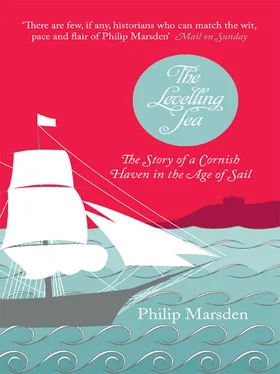Sometimes reading the accounts of the sea battles of that time, the engagements involving privateers or ships-of-the-line, you have the sense less of the total war of the twentieth century than of some watery medieval tournament, a grand and deadly game in which each side, however pitiless, is bound by natural rules – the no-go areas to windward, the fatal advantage of the weather gage.
In the recent, post-industrial attraction to the wild, a yearning driven above all by the realisation of our distance from it, the sea is rarely mentioned. Yet it is perhaps the only true wilderness. You cannot manipulate the sea, you cannot cultivate it. Efforts to ‘farm’ its margins have in most cases proved disastrous. Fishermen are not agriculturalists; to find their equivalent on land you have to go back beyond written history, to hunter-gatherer groups of the Mesolithic age. The sea teaches the lesson every ecologist urges us to understand about the natural world: that it cares nothing for us, that it will survive us. Try to impose your will upon it and it will destroy you. Swim through it or pass over it in a boat, and you leave not a trace. In time it will, like sand over the works of Ozymandias, close over every brick, every avenue and every last relic of our civilisation.
That is the wisdom of the sea, its essential paradox. It quickens us, extends us, prompts feats of innovation and courage, then washes them all away. No trace remains; man and mountain yield to the levelling force of the sea. In its omnipotence, its beauty and its purity, the sea is the earthly manifestation of the divine. Building a vessel and crossing a body of water is a transcendent achievement, and afterwards nothing in this life quite compares.
During my first winter on the Fal estuary, my grandfather would telephone frequently from his home in Hampshire. He was now 90. He wanted to know exactly what the weather was doing, about the sea state, what ships had been going in and out of Falmouth. No detail was too trivial. Spring tides or neaps? Is the ferry running? He examined the weather maps and asked: has the wind backed yet down there? Has the cold front passed over you? He quizzed me about all those boats he knew, the people of the shore, the fishermen and part-time gardeners, the summer sailors and retired boat-builders. And then one storm-dark December afternoon, he rang and asked me: would I be kind enough to do something for him? Would I go up the river, have a look at Ratona?
In the dusk I walked through the cliff-top fields to where Ratona was wintering. She stood on legs at the rim of a tidal pool. Her bowsprit pushed up towards the serpentine roots of a group of Monterey pines; behind them was St Just churchyard, a mossy necropolis of slate and granite headstones. Two mooring warps looped out from Ratona’s stern, down into the ebbing tide. Twice a day the water rose and fell around her, keeping her boards tight with moisture. The church clock’s chimes rang out across the creek every quarter of an hour.
Climbing down to the muddy foreshore, I ran my hand along the curve of her waterline – the green topsides and scum-crusted red of her anti-fouling. I looked at the chain-plate, and the place where her mast should be and the winter cover stretched down tight over the ridge-pole, and was overwhelmed by a sense of the vanished past, of a hundred half-remembered scenes – squinting up the mast to check the lift of the cotton luff, gazing at the lee gunwale as the water rushed past it, rowing ashore in some hidden cove and looking at her at anchor, or lying again in the forepeak, cushioned by sail-cloth. With a squelch, I yanked my boots out of the mud, and climbed back up to the churchyard. The winter wind combed through the pines. It was almost dark.
I rang my grandfather that evening and told him Ratona was in fine shape. ‘Good,’ he said. ‘That’s splendid …’ His words sounded distant. Just two weeks later, at his Hampshire home, he developed pneumonia and died.
When I was very young, I thought there were two grandfathers, one in Hampshire, in woollen tie and leather-elbowed jacket, listening to music in his book-lined study. The other one lived in Cornwall, and was wilder, and more adventurous, and more appealing to a young boy. He wore sea-boots and salt-crusted trousers; he draped sails from the banisters to dry; he tinkered with tackle and rope, rowed his dinghy standing up. The memorial service for the first took place in a flint-walled church near the River Test, a dark-suited parade of family and surviving friends. It was several weeks later when there was a ceremony for the other grandfather. His ashes were brought to St Just. Only three of us stood with the vicar at the graveside. The wind sighed in the Monterey pines. We placed his ashes among the roots. Just yards below him, as if he was some Norse hero buried with his boat, lay Ratona.
My grandfather.
I have been away for a few weeks and now I go down to the water. Summer rain has left my upturned dinghy with green fur around the gunwales. I scrub it down, haul it to the beach and into the shallows. I sense the sudden lightness as the stern lifts and bobs free. The rowlocks clunk-clunk into the silence of the Percuil river. On the far side, beneath a flocculent strip of woods, lies the 21-foot harbour launch I bought some years ago with a friend. In the 1920s she was built as a liberty-boat, a solid workhorse of a naval craft, used to ferry men and supplies around Chatham harbour. Traditionally these launches took sailors ashore, from ship-bound service to shore-bound freedom – hence the name. For me, it has exactly the opposite meaning.
In the rounded clinker sides, the spade-like rudder, the steep and solid stem, I like to imagine centuries of maritime evolution. I picture the shipwright between the wars, circled by fresh-faced groms, instructing them in laying the keel, fixing the garboards, conjuring the lines outwards and upwards with each riveted strake, working as countless generations had before him, without plans, with no more than a practised eye and a couple of notions – to make the bilge a little deeper this time, the quarter a little fuller, and having the instinctive means to do it. A War Department registration is carved into the transom: WD 347. We call her Liberty.
Liberty’s stern.
She is the last moored boat, at the far edge of a forest of spars. Beyond is a crescent of wooded shoreline and beach that now, towards the bottom of the tide, dries to mud. One or two punts lie on their sides, the sag of their painters hung with fronds of channelled wrack and eel grass. I am always amazed by the stillness of this place. Even in a rising gale, with gusts racing down from the slopes to scurry across the water, with the halyards beating out warnings from the masts in the river, the pool retains a calm so intense that I often sit here long after I have packed away the gear, engulfed by its presence.
It is thought that this small inlet was among the earliest-used anchorages of the Fal, the natural refuge of a ship groping in from the storms of the Western Approaches, running for the lee of St Mawes harbour, round into the mouth of the Percuil, then round again to settle on its side in this muddy cul-de-sac – tin ships from the Gironde, Breton traders, and those who brought no worldly goods, who kept within them no thought of return to their native ports. Long before the estuary’s main shoreside settlements had appeared, monastic communities were measuring out their days here, with prayer and fishing and contemplation.
This then is how history begins on the shores of the Lower Fal, with groups of beehive huts and shaggy men half attached to the world, who immersed themselves up to the neck in the freezing water and pressed songs of devotion from their chattering lips. They were holy sea-wanderers, peregrini, who in the name of Christ took to the open water in the post-Roman centuries, trusting less to the rigours of seamanship than to divine providence. The sea was their desert, a blank alternative to the troubled world, and retreating to it an enactment of the reckless example of St Anthony. But the waters of north-western Europe are a harsher place by far than the wastes of Egypt. How many perished, drowned or starved in the great flat-horizoned emptiness, we shall never know. In the Fal, salvation was a labyrinth of wooded creeks, tidal waterways that pushed up far into the hinterland. They left their names in a series of creek-side churches. The one here is St Anthony’s – the dedication honouring not the father of Christian monasticism, but the Cornish royal martyr, Entenius.
Читать дальше












